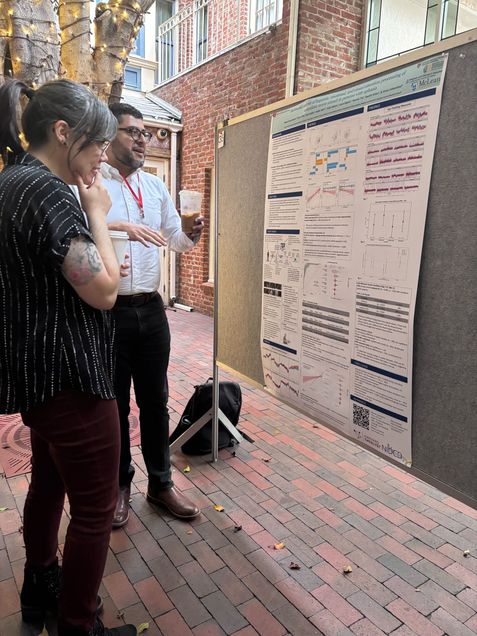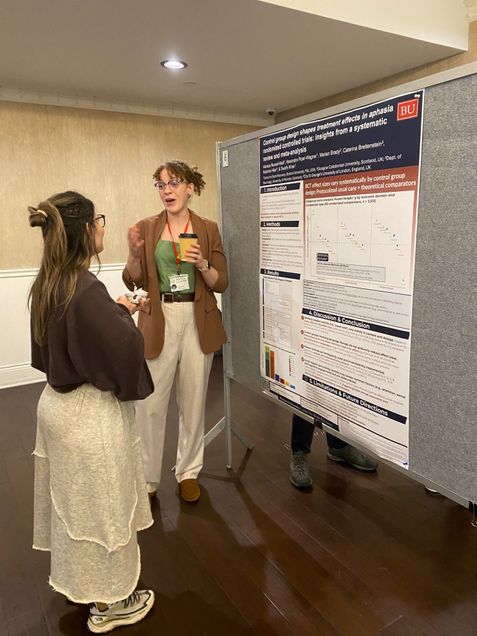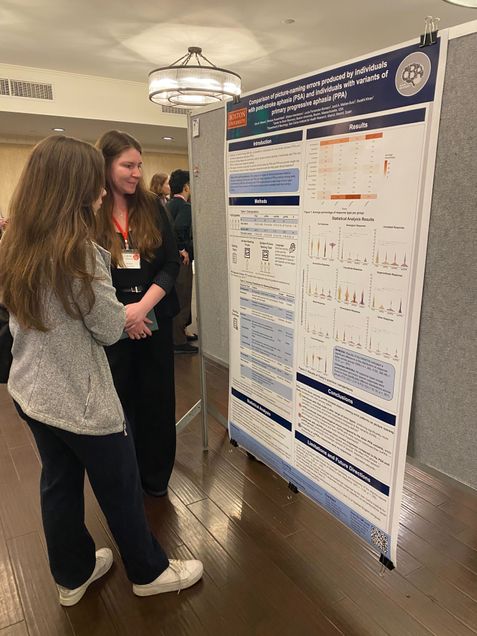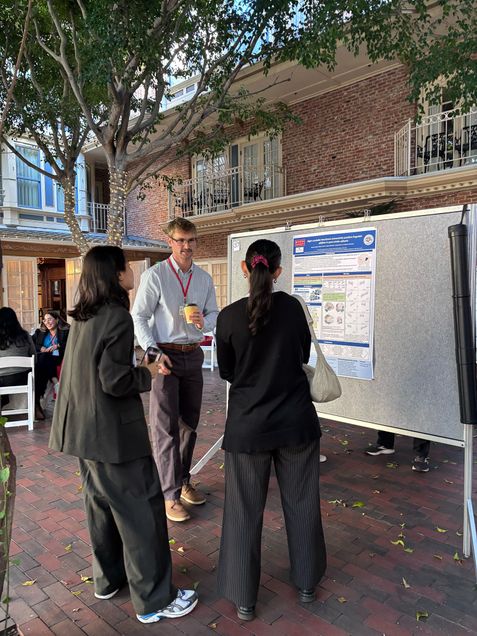CBR Attends the Academy of Aphasia Annual Meeting 2025
October 26th – 28th, 2025
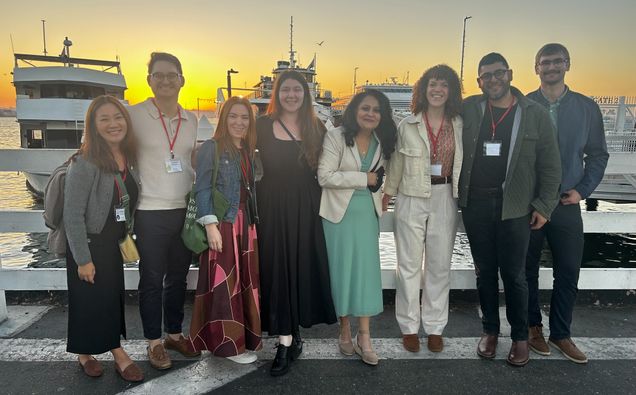
Eight researchers from the Boston University Center for Brain Recovery (CBR) attended the 63rd Annual Meeting of the Academy of Aphasia this October to present their work and gain new insights from peers in the fields of neuroscience and speech, language, and hearing sciences.
Platform Sessions
Shalom Henderson (Postdoctoral Associate) and Michael Scimeca (PhD Candidate), two members of the CBR team, each presented their recent research in platform sessions on Day 2 of the conference.
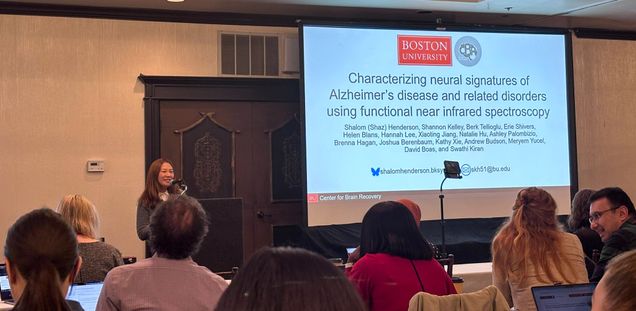
Shalom Henderson presented her research titled “Characterizing neural signatures of Alzheimer’s disease and related disorders (ADRD) using functional near infrared spectroscopy (fNIRS)”.
This study examined real-time brain activity using fNIRS in individuals across the Alzheimer’s disease spectrum, including those with subjective cognitive impairment (SCI), mild cognitive impairment (MCI), and Alzheimer’s disease dementia, while they answered personal and general questions. The hypothesis of this study was that individuals with ADRD would show reduced fNIRS amplitudes in language-relevant cortical regions compared to healthy adults.
The findings from this research showed:
- Overall reduced fNIRS amplitudes with region-specific increases in those with dementia
- Strong right temporal engagement in healthy adults
- Selective activation of the left middle frontal gyrus and right frontal regions in individuals with SCI
- Declines in speech output and lexical richness from SCI to MCI to dementia
- A positive association between right temporoparietal activation and talk time in the dementia group
These results highlight distinct neural and speech patterns across stages of cognitive decline and point to fNIRS as a promising tool for capturing early language-related brain changes.
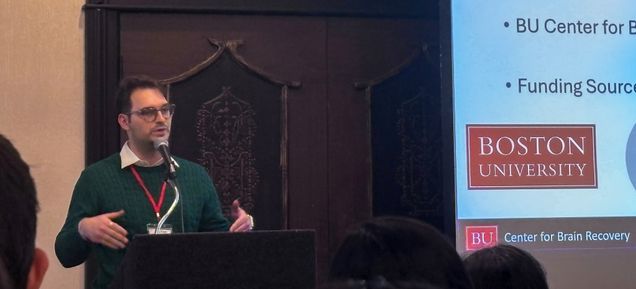
Michael Scimeca presented his research, “Real-time processing of semantic constraint during silent reading: Evidence from eye-tracking”.
This study examined how semantic constraint— the extent to which a sentence frame guides the appearance of certain target words— affects real-time reading comprehension in monolinguals and bilinguals with and without aphasia.
The results from this study showed:
- Compared to the healthy control groups, both groups with aphasia understood the sentences less accurately; however, comprehension accuracy was high across all groups overall suggesting the all participants were engaged and able to complete the reading task.
- On their first pass through the sentences, both aphasia groups demonstrated slowed lexical access and were not sensitive to the semantic constraint manipulation. Relative to the monolinguals, the bilingual aphasia group showed weaker and more variable patterns of comprehension, indicating a possible interaction between bilingual background or proficiency and post-stroke reading ability.
- On successive passes through the sentences (i.e., during rereading), both aphasia groups showed were sensitive to the semantic constraint manipulation, spending more time rereading sentences whose weaker semantic cohesion made integration of the target word more demanding. The bilingual aphasia group showed the same direction of effects but with greater variability across items.
Poster Presentations
The following posters were presented by CBR researchers at the 63rd Annual Meeting of the Academy of Aphasia.
Maria Varkanitsa, Assistant Scientific Director
“Interbrain synchrony as a potential biomarker of communicative success in aphasia: preliminary evidence from fNIRS hyperscanning”
Magee, G., Colwell, J., Licata, J., Kelley, S., Tellioglu, B., Boas, D., Kiran, S., Varkanitsa, M., Meier, E., & Yücel, M.
View the Poster
Emerson Kropp, Research Assistant
“Right cerebellar functional connectivity predicts linguistic abilities in post-stroke aphasia”
Kropp, E., Carvalho, N., Sebastian, R., Kiran, S., Varkanitsa, M.
View the Poster
Manuel Marte, PhD
“Multimodal analysis of linguistic, emotional, and visual attention processing of naturalistic movie stimuli in persons with aphasia”
Marte, M. J., Gillis, B., Goldin, K., Wei, X., Galvin, C., Rigolo, L., Tie, Y., Kiran, S., & Liebenthal, E.
View the Poster
Erie Shivers, Research Assistant
“Comparison of picture-naming errors produced by individuals with post-stroke aphasia (PSA) and individuals with variants of Primary Progressive Aphasia (PPA)”
Shivers, E., Russell-Meill, M., Henderson, S., Fernández-Romero, L., Matias-Guiu, J. A., & Kiran, S.
View the Poster
Marissa Russell-Meill, PhD Student
“Control group design shapes treatment effects in aphasia randomized controlled trials: insights from a systematic review and meta-analysis”
Russell-Meill, M., Brady., M., Breitenstein, C., Hilari, K., & Kiran, S.
View the Poster
